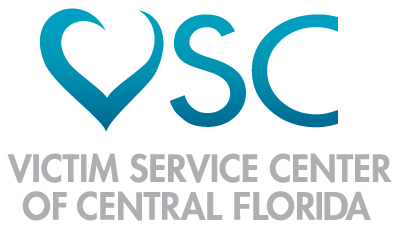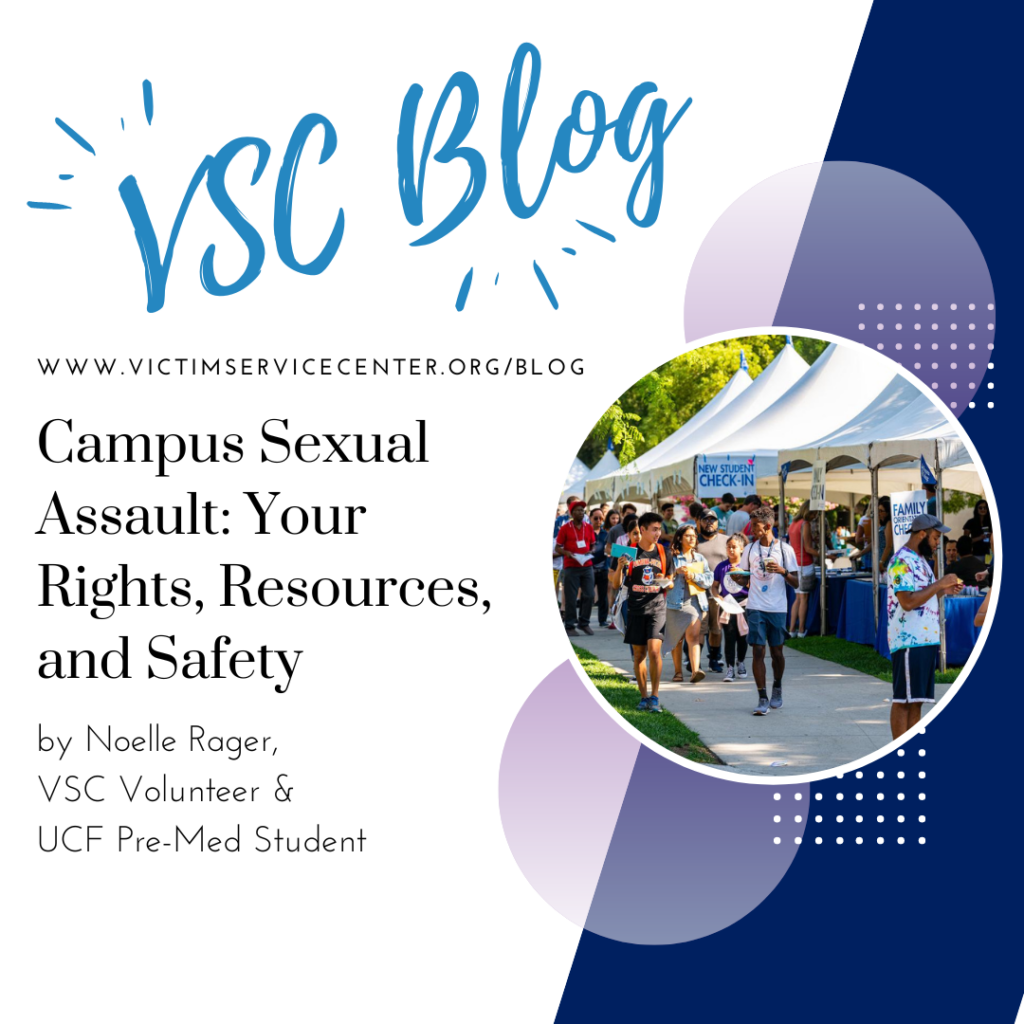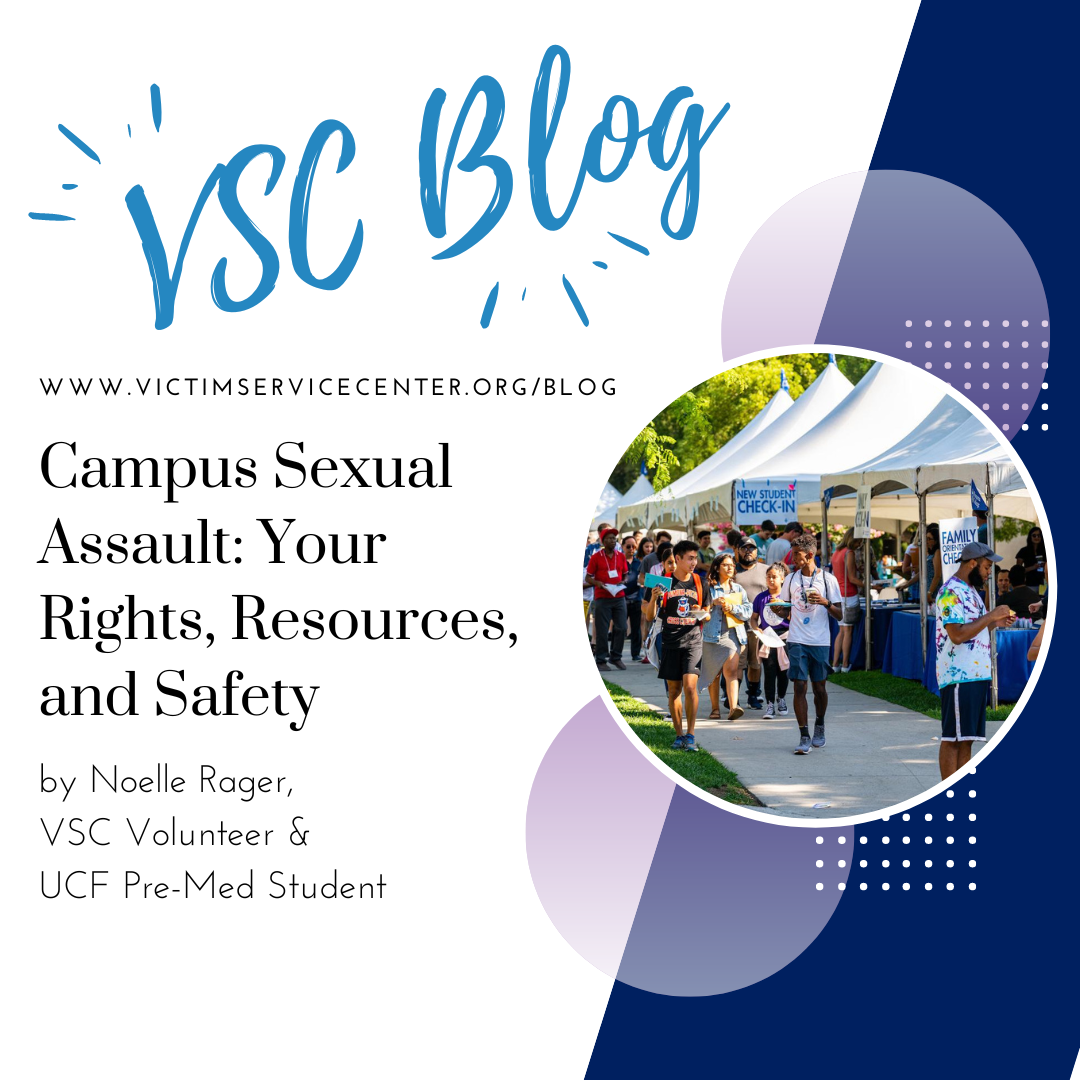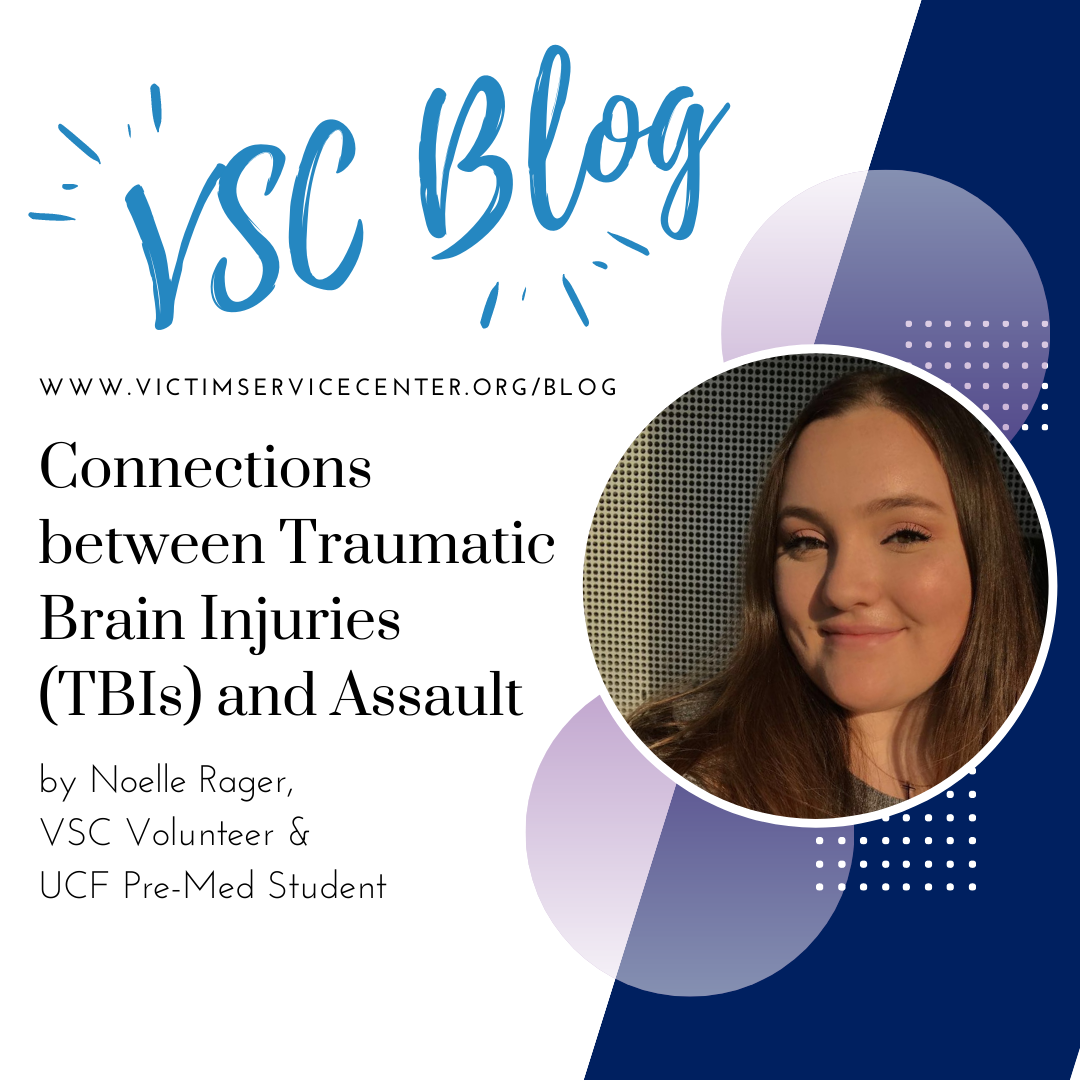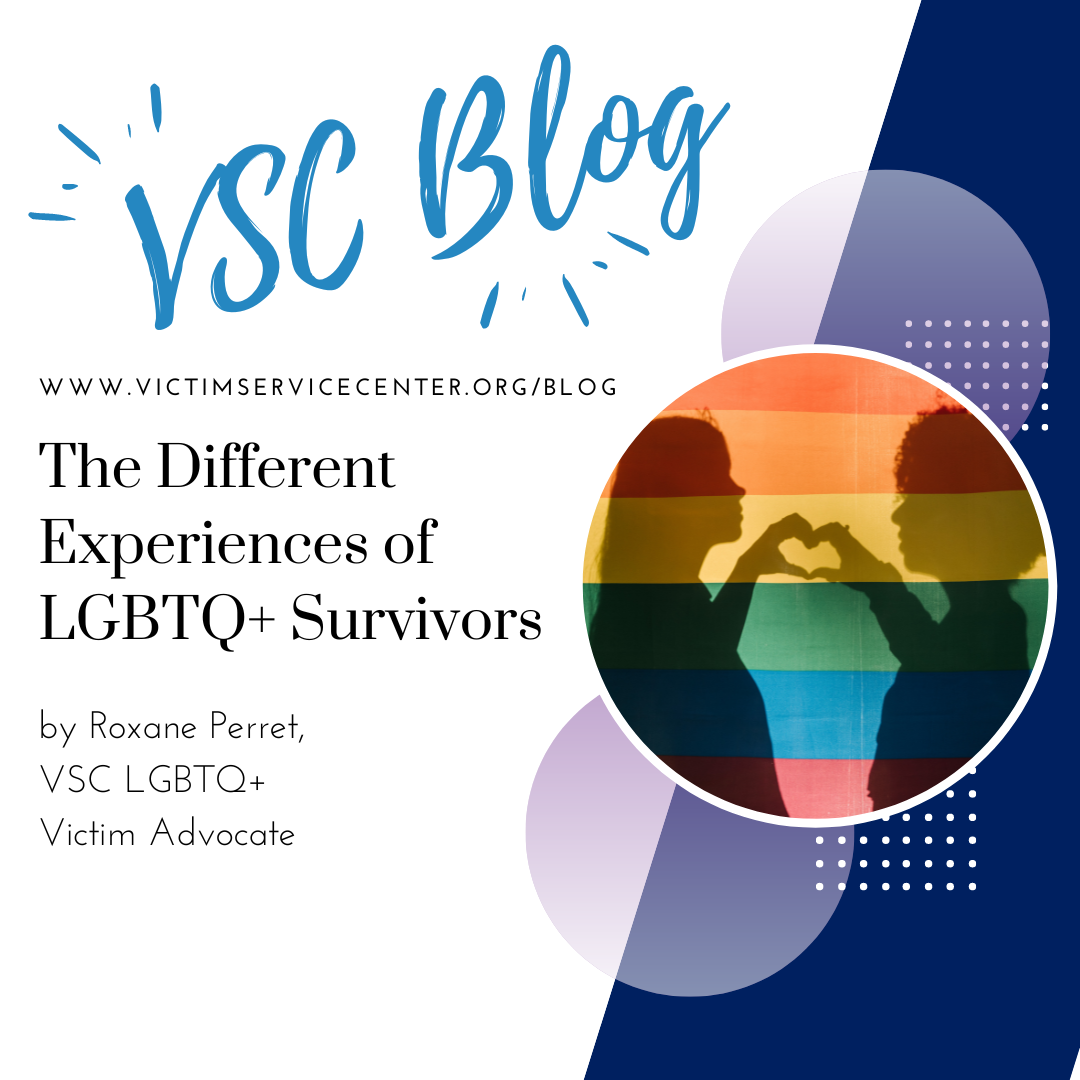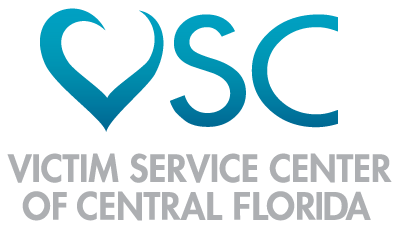By Noelle Rager, VSC Volunteer & UCF Pre-Med Student

Trigger Warning: This blog post discusses sensitive topics such as sexual assault. It’s important to take care of yourself while reading. Some suggestions are reading while you’re in a healthy headspace or knowing who you can reach out to if you become upset. Our 24/7 helpline for crisis calls based out of Central Florida is (407) 500-HEAL. To get additional support and/or learn about your local resources, the National Hotline can be contacted at 1-800-656-4673. There is always someone ready to help.
Prevalence of Sexual Assault in College

As summer comes to an end and we head towards the beginning of the school year, students get excited about moving back to campus, the upcoming football season and activities, making new friends, and immersing themselves in the typical college environment. A heavy, but important, topic to discuss is sexual violence and how you can stay safe to ensure your campus life is just as exciting as you are hoping it will be. RAINN, the Rape, Abuse, & Incest National Network compiled data on campus sexual violence and found that 13% of all students experience sexual assault, with a higher rate for undergraduates and female students.1 According to RAINN, over 50% of college sexual assaults occur during the months of August to November, which has been labeled the “red zone”.1 During the “red zone”, sororities and fraternities hold their “rush” events, new students are unfamiliar with the campus, there is an abundance of parties, and many students lack an established network of friends, all of which can contribute to the spike in sexual violence. Here are a few statistics to consider:
Title IX Federal Law
Title IX is a federal civil rights law that prohibits discrimination in education on the basis of sex which includes all forms of sexual harassment. Colleges receiving federal funding are required to ensure equal access to education for all students while actively combating gender-based violence and discrimination. Title IX applies to every student whether they are female, male, or gender non-conforming. Under this law, schools must investigate every formal complaint, have a Title IX coordinator, have procedures for students to file complaints, and must publish and distribute a policy against sex discrimination. A few areas Title IX covers are:
– Sexual Violence
– Gender-Based Discrimination
– Sexual Harassment
– Pregnant and Parenting Students
– Women in STEM programs
Title IX also requires colleges to provide free supportive measures to the victim but what this amounts to will differ depending on the situation. These measures can include counseling, tutoring, extended deadlines, a leave of absence, campus escort services, housing reassignments, etc.
Ideas for Safety Planning
Safety planning is creating a personalized plan to help reduce the risk of future harm. A safety plan can look vastly different depending on the person, but they often include preventative measures, coping strategies, and creating a list of the resources that are available to support you. As a reminder, whether or not preventative actions are taken, it is never your fault. Some things that may be included on a safety plan for college students are:
- Stay alert: Looking down at your phone is an easy distraction and may leave you unaware of your surroundings. While walking around campus, stick to populated, well-lit areas, when possible, and stay mindful of your surroundings.
- Consider changing your social media settings: Some social media websites may use geolocation, so any posts allow your followers to see your location. Consider making your accounts private so only family and friends you trust are able to view your posts.
- Use the buddy system: There is safety in numbers so taking a friend with you, whether it is while you are walking to class or just grabbing a coffee, reduces your chances of becoming a victim of a crime.
- Share your location with family/friends: In case of an emergency, it is helpful for trusted family and friends to have your location to be able to alert authorities if necessary.
- Give people time to earn your trust: The college environment can foster a false sense of closeness that can lead to putting too much trust into someone too early. You will likely make many friends very quickly, but it is okay to take your time and let them truly earn your trust before you depend on them.
- Make a plan when going out: Before going out for the night, make a plan with your friends that everyone will stick to, that includes how everyone is getting home. Make sure if plans change, no one is left alone.
- Keep an eye on your drink: Many drugs that are used in drug-facilitated sexual assault are colorless, odorless, and tasteless so it’s not always possible to tell if something has been added to a drink. Some safety tips to consider are drinking from unopened containers or drinks you watched being poured, keeping your drink with you at all times, and not taking drinks from strangers.
- Know your drinking limits: Keep track of how much alcohol you have consumed, if possible. If you or a friend begin to feel extremely tired or more intoxicated than you should, it is possible that you have been drugged. Leave the situation and get help immediately.
- It is okay to lie: You never have to stay in a situation that makes you feel uncomfortable or threatened. If you want to leave a situation and are worried about upsetting someone or it possibly becoming dangerous, it is okay to come up with an excuse such as needing to take a phone call, not feeling well, having to take care of a friend, etc.
- Explore self-defense classes: Self-defense classes aim to empower you by teaching realistic self-defense techniques and providing education on basic safety and awareness which can help build self-confidence.
- Campus escort services: Some colleges provide escort services that are available to walk with you to and from locations or provide transportation, offering a safer alternative to walking alone.
- Meet first dates or new people in a public area.
- Mobile apps: There are many useful safety apps that are free to download including LiveSafe and bSafe for Android and IOS along with ReachOut which is available on IOS.
- Consider creating a plan for what to do if you find yourself in a triggering situation: There are many different templates for safety plans that are available online that may help you start to brainstorm some ideas on how to cope with overwhelming emotions.
Survivors of assault may experience retraumatization in triggering situations like when they return to the environment the assault occurred or seeing their perpetrator on campus, for example. For this reason, safety plans often include suggestions for self-care or coping skills that may help when you are feeling triggered. Grounding and mindfulness techniques are commonly used strategies that help people regulate overwhelming emotions, connect with the present, and feel calmer. There are many different ways to practice grounding and mindfulness exercises. A brief overview of a few grounding techniques is shown in the infographic below:6

Campus Specific Resources
Along with the general safety tips discussed, each college campus has additional resources available for your safety. You can find the schools corresponding resources below:
University of Central Florida:
–Let’s Be Clear lists the contact information for Counseling and Psychological Services, Student Health Services, Victim Services, Student Care Services/UCF CARES, and links to the relevant policies on discrimination, Title IX, etc.
-The Office of Student Rights and Responsibilities has compiled a list of complainant resources that are separated into confidential, nonconfidential, and community resources. Along with the information on Let’s Be Clear, the contact information for Student Legal Services is provided as well.
-Call the confidential 24/7 Advocacy and Support hotline at 407-823-1200.
-In the UCF Mobile app, the “SafeWalk” feature allows you to share your location, destination, and ETA with others who can track your trip in real-time. Your selected friends will receive updates and are able to message police for assistance by sending information on your location and timing from the app, in the event of an emergency.
-Call 407-823-5555 to request a security escort anywhere on campus. A UCF Police staff member or officer will walk with you to your destination.
*At UCF Downtown, to request a security escort you can also call 407-235-3800
Valencia College:
-Information on Valencia’s Title IX Coordinators and campus security phone numbers can be found here
–Victim Assistance Agency phone numbers listed by campus along with the BayCare Student Assistance Program which is a free service for Valencia students that is available 24/7. The BayCare services include, but are not limited to, webinars, support for mental and physical health, legal support, financial literacy information, personal and professional development courses, recipes, and health videos.
-The Valencia College Safety app enables you to send your location and call security simultaneously, in the event of an emergency on campus. It also includes campus maps, emergency contact information, a place to report tips, and more safety features.
-Campus Escort System: You may contact your campus Security Office to request a security officer to accompany you to your class or vehicle.
-Valencia provides a list of community-based organizations here
Rollins College:
–The Title IX and Violence Prevention webpage has detailed information for immediate action, confidential assistance, support, and reporting following sexual misconduct.
–Title IX: Sexual Misconduct and Harassment Policy is a PDF file that contains confidential and nonconfidential resources as well as the Title IX policy details.
-Free and confidential counseling at the Wellness Center via Counseling and Psychological Services (CAPS). Students can call 407-628-6340 to schedule an appointment to meet with a counselor.
-Call Campus Safety at 407-646-2999 for assistance with transport on campus. Campus Safety is available 24/7 and can also call for medical transport in emergency situations.
Seminole State College:
-Title IX report: Contact the SSC Equity and Diversity/Title IX Coordinator, by email, phone, mail, or in person.
-The Title IX webpage has a chart that describes an issue and lists the corresponding resource that addresses like who to call to change classes for separation from alleged perpetrator, seek counseling, etc.
-Campus Escort System: Call the security number at 407-708-2178 for an escort to or from your car.
Full Sail University:
-Information on Full Sail University’s Title IX policy, coordinator, complaint form, and community resources such as the National Sexual Assault Hotline can be found here
-Campus Escort System: Call 8800 24 hours a day and the security department will send an officer for a safety walking escort if you are within Fail Sail property limits.
Ana G. Mendez University:
-Title IX report: Contact the Title IX Coordinator by email, phone, mail, or in person.
–Sexual Violence, Dating Violence, Harassment and Discrimination by Sex (VAWA-Title IX) is a PDF file that details safety measures, community support resources, student rights under Title IX, how to file a complaint, and additional resources.
References:
1. Campus sexual violence: Statistics. RAINN. (n.d.). https://www.rainn.org/statistics/campus-sexual-violence
2. Cantor, D., Fisher, B., Chibnall, S., Harps, S., Townsend, R., Thomas, G., Lee, H., Kranz, V., Herbison, R., & Madden, K. (2020). Report on the AAU Climate Survey on Sexual Assault and Sexual Misconduct. Association of American Universities.
3. Krebs, C., Lindquist, C., Berzofsky, M., Shook-Sa, B., Peterson, K. (2016). Campus Climate Survey Validation Study Final Technical Report. Bureau of Justice Statistics, U.S. Department of Justice.
4. Preventing sexual assault. Collage Stats. (2017, May 8). https://collegestats.org/resources/sexual-assault-prevention/
5. Preventing sexual assault in college. EduMed. (2022, January 28). https://www.edumed.org/resources/preventing-sexual-assault-in-college/
6. Schmidt, L. (2021, December 10). Six different types of grounding exercises for anxiety and intense emotions. The Growlery. https://www.tothegrowlery.com/blog/2017/4/18/six-different-types-of-grounding-exercises-for-anxiety-intense-emotions
7. Sexual assault on college campuses. Sexual assault on college campuses | Office on Women’s Health. (n.d.). https://www.womenshealth.gov/relationships-and-safety/sexual-assault-and-rape/college-sexual-assault
8. Staying safe on campus. RAINN. (n.d.-b). https://www.rainn.org/articles/staying-safe-campus
9. US Department of Education (ED). (2021, January 5). Know your rights: Title IX prohibits sexual harassment and sexual violence where you go to school. Home. https://www2.ed.gov/about/offices/list/ocr/docs/title-ix-rights-201104.html
